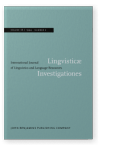Vol. 18:2 (1994) ► pp.223–242
Plus-Que-Parfait
Past anterior or past punctual?
Plus-que-parfait: past anterior or past perfect? Following the author's investigation into the use of plus-que-parfait, passé antérieur and passé surcomposé by means of a gap-filling exercise administered to native speakers (Engel forthcoming), it appears that plus-que-parfait (PQP) is not a rival to the other two past anterior forms, despite their relative infrequency, i.e. it cannot replace them in particular contexts. Furthermore, PQP is not the automatic choice in seemingly appropriate PQP environments. It has also been noted by various scholars (such as Majumdar & Morris 1980) that PQP is increasingly taking on a past punctual function, which is of some interest considering its affinity to imparfait, i.e. the non-punctual past. This paper reexamines data from the author's corpora of newspaper texts, looking at the role of PQP, in order to establish its particular function in modern journalistic texts. Finally, an overview of the various shifts in the French tense system is presented, paying particular attention to the past and past anterior forms, that area which has witnessed the most change.
Cited by
Cited by 1 other publications
This list is based on CrossRef data as of 3 april 2024. Please note that it may not be complete. Sources presented here have been supplied by the respective publishers. Any errors therein should be reported to them.
